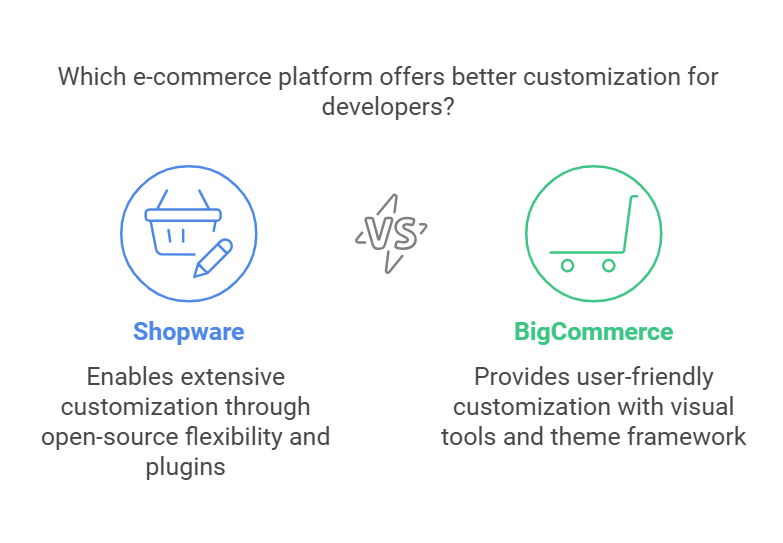Greetings! I'm Aneesh Sreedharan, CEO of 2Hats Logic Solutions. At 2Hats Logic Solutions, we are dedicated to providing technical expertise and resolving your concerns in the world of technology. Our blog page serves as a resource where we share insights and experiences, offering valuable perspectives on your queries.

| Quick Summary Shopware: Highly customizable, ideal for scaling businesses, and offers full control over SEO and technical aspects. BigCommerce: Easy to use, and offers built-in SEO tools with less customization needed. Choose Shopware for flexibility and growth potential, and BigCommerce for ease of use and simplicity. |
Not sure whether to choose Shopware or BigCommerce? We understand selecting the perfect e-commerce platform for your business can be tough. Whether you’re launching a new store or planning to switch platforms, you need a solution that aligns with your business goals.
But which one is the best fit?
We’ve been there, evaluating features, pricing, flexibility, and growth potential. In this blog, we’ll break down Shopware and BigCommerce to help you make an informed decision without the guesswork.
Platform Overview
Before exploring the key features of Shopware and BigCommerce, it’s important to understand their core differences.
| Feature | Shopware | BigCommerce |
| Hosting | Open-source platforms can be self-hosted | Cloud-based SaaS platform |
| Market Focus | Popular in European markets, especially Germany | More popular in English-speaking markets |
| Customization | Highly customizable with access to source code | Visual page builder with drag-and-drop functionality |
| Technical Expertise | Requires more technical knowledge for setup and maintenance | Easier to set up and maintain |
| Pricing | One-time purchase with optional support subscriptions | Monthly subscription model |
| B2B Capabilities | Excels in custom price lists, quote management, and approval workflows | B2B Edition offers bulk pricing, company accounts, and custom payment terms |
| Multi-Store Management | Supports multiple stores with shared inventory and tax regulation compliance | Centralized control over products and orders with regional pricing support |
Feature Comparison: Shopware vs BigCommerce
Compare the features of Shopware and BigCommerce to determine the best fit for your business.
Customization Options

Comparison of Shopware and BigCommerce
- Shopware: Its open-source nature allows developers to modify every aspect of the storefront. Its plugin system supports both custom development and ready-made solutions.
- BigCommerce: Utilizes a visual page builder for basic customization. The Stencil theme framework enables developers to create unique store designs.
Scalability Features
- Built for complex product catalogs
Shopware adapts to growing businesses through its modular architecture and enterprise-grade features. It is ideal for handling complex product catalogs and high-traffic volumes.
Pro Tip
Ensure to check your hosting setup regularly to ensure it’s performing well.
- BigCommerce: Automatically scales with business growth without requiring additional configuration. The enterprise plan supports up to $400M in annual sales with advanced API capabilities.
User Experience
Shopware offers high customization and flexibility, with a responsive design and robust plugin ecosystem. It enables businesses to create personalized shopping experiences and continuously optimize store functionality.
BigCommerce provides a solid platform with built-in features but has limited customization options. It’s suitable for businesses with straightforward e-commerce needs but may not offer the same level of design and functionality control as Shopware.
Payment & Shipping Capabilities
Payment and shipping capabilities are essential features in an online store, influencing customer decisions. A smooth payment gateway adds value to your store.
| Feature | Shopware | BigCommerce |
| Payment Integration | Integrates with European providers like Klarna, PayPal, and Stripe for EU localization. | Supports global gateways but lacks deep European localization. |
| Shipping Capabilities | Advanced modules for custom rules, multi-warehouse setups, and real-time rates. | Limited customization for complex logistics needs. |
| Overall Suitability | Ideal for businesses needing EU-focused, scalable, and customizable solutions. | Broad focus but less effective for European businesses or advanced needs. |
Advanced SEO Tools
Shopware SEO: Shopware provides control over SEO, including granular customization of meta tags, URLs, and sitemaps. Its built-in support for Rich Snippets enhances search engine visibility, giving businesses a competitive edge.
Shopware also excels in image optimization with built-in tools for compression and alt-tag management. For large-scale businesses with complex SEO strategies, Shopware offers superior scalability.
BigCommerce: BigCommerce offers basic SEO-friendly features but lacks the flexibility and depth of Shopware. For example, its URL customization and Rich Snippets support are less comprehensive.
Image optimization often requires third-party solutions, adding complexity to the process. BigCommerce is better suited for smaller stores with simpler SEO needs. Shopware stands out as the best SEO-friendly alternative among many options available for BigCommerce.
Marketing & Promotion Tools
Marketing and promotion are essential in every online business, so carefully analyze your needs and choose the right option.
Shopware:
- Advanced, highly customizable promotion rules tailored to specific customers or segments.
- Powerful Marketing tools for segmenting customers based on behavior, demographics, or purchase history.
- Delivers personalized shopping experience through tailored content and offers.
- Comprehensive marketing suite with email campaigns, abandoned cart recovery, and performance tracking.
- Designed to handle complex and large-scale marketing strategies.
Bigcommerce:
- Basic promotion tools with limited customization options.
- Customer grouping is less dynamic and lacks detailed segmentation.
- Personalization options are limited compared to Shopware.
- Built-in email marketing and cart saver features but less robust overall.
- Better suited for simpler marketing needs of smaller businesses.
Check out our comprehensive checklist to help you choose the right e-commerce platform for your business.
Pricing Comparison
Even if a platform meets all your requirements, price often becomes an issue. Choose the one that fits your budget without compromising your needs.
| Pricing Aspect | Shopware | BigCommerce |
| Payment Model | Both one-time purchases with optional subscriptions and monthly subscription-based models are available | Monthly subscription-based model |
| Additional Costs | Hosting, server, and premium plugins | Transaction fees on certain gateways |
| Entry-Level Pricing | Starts at €45/month for Shopware Cloud Rise | Starts at $29.95/month for Standard Plan |
| Enterprise-Level Pricing | Custom pricing based on business needs | $299.95/month for Pro Plan; Custom pricing for Enterprise |
Cons Comparison
| Cons | Shopware | BigCommerce |
| Technical Complexity | Requires technical expertise for setup | Limited flexibility in core functionality |
| Costs | Additional hosting and plugin costs | Higher costs with plan upgrades |
| Community Support | It may be slower for complex queries | Limited B2B features in lower plans |
Scalability for Growing Businesses
Shopware effectively handles complex operations and multi-store setups. Its modular architecture is ideal for businesses with expansive catalogs and high-traffic demands.
Fact
The active Shopware developer community regularly adds new plugins and features, providing plenty of customization options.
BigCommerce: Scales easily with SaaS infrastructure but has limited flexibility for advanced customizations.
Why Shopware is the Growth-Focused Choice?
- Shopware’s adaptability caters to both small startups and large enterprises.
- Its open-source model ensures unparalleled flexibility and customization.
- Ideal for European markets with advanced localization features.
Stay informed with articles on the best platforms for your business. Subscribe to our newsletter for expert tips and trends.
Conclusion
For businesses looking to unlock e-commerce growth, Shopware stands out with its flexibility, customization, and enterprise-grade features. Partner with 2Hats Logic, a Shopware expert, to utilize the platform’s full potential and power your e-commerce success.
FAQ
Which platform is better for businesses with limited technical knowledge?
BigCommerce is better for non-technical users due to its guided setup and intuitive interface. Shopware, however, requires technical expertise but offers greater flexibility.
Does Shopware support cloud hosting like BigCommerce?
Yes, Shopware Cloud starts at €199/month, combining the benefits of a hosted solution with Shopware's flexibility.
Are there any hidden costs in either platform?
Shopware may have additional hosting and plugin costs, while BigCommerce may charge transaction fees depending on the payment gateway used.
Which platform is better for scaling businesses?
Shopware is perfect for complex operations, multi-store setups, and large catalogs, making it ideal for growth. BigCommerce provides easy scaling for smaller to medium-sized stores but lacks advanced customization.
How does SEO performance compare between the platforms?
Both platforms offer robust SEO tools, but Shopware provides deeper control over technical SEO aspects like metadata and URL structure. BigCommerce simplifies the process for beginners with automated features.

Related Articles




